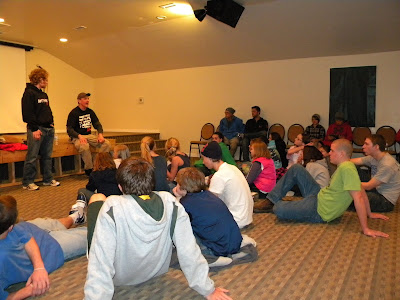Sandy Hill Campground is any outdoorsy kid's dream. The 211 acres of fields and woods offer many activities. The dining hall with rows of tables and plastic buckets with color-coded labels for knives, forks, and spoons. The soccer fields are strewn with soccer balls and frisbees. The ropes course has pulleys and harnesses, bags of helmets and leather gloves in crates. The wooden buildings for summer bunks are scattered at the top of a bluff over-looking the Chesapeake Bay to the east. Just slightly farther north, the C&D canal connects the Chesapeake to Delaware Bay and out into the Atlantic.
 Diabetes camp isn't unlike any other regular summer camp. There are new people to meet, names to remember, camp food to digest, safety lectures to pay attention to. There are feats of strength, fear of heights, homesickness, and disgust of spiders. There's dirt and leaves and scrapes and bruises. But at diabetes camp there are also alcohol swabs, lancets, testing strips and glucose meters. At meals, there are pens and pencils and small squares of paper for campers to add up the carbs they eat at each meal. There are glucose tablets and juice boxes.
Diabetes camp isn't unlike any other regular summer camp. There are new people to meet, names to remember, camp food to digest, safety lectures to pay attention to. There are feats of strength, fear of heights, homesickness, and disgust of spiders. There's dirt and leaves and scrapes and bruises. But at diabetes camp there are also alcohol swabs, lancets, testing strips and glucose meters. At meals, there are pens and pencils and small squares of paper for campers to add up the carbs they eat at each meal. There are glucose tablets and juice boxes. Any overnight camp is a character-building experience. Camper/Athletes learn to work together to climb a tower, encourage each other to "super-size" their starting points on the giant swing. (That means start from the highest point, and the scariest) The camper/athletes learn to keep track of their belongings without mom and dad. They make friends, hear inspiring stories from diabetic role models, and learn how to identify plants and seeds in the forest.
Any overnight camp is a character-building experience. Camper/Athletes learn to work together to climb a tower, encourage each other to "super-size" their starting points on the giant swing. (That means start from the highest point, and the scariest) The camper/athletes learn to keep track of their belongings without mom and dad. They make friends, hear inspiring stories from diabetic role models, and learn how to identify plants and seeds in the forest.  But none of that is the real value derived from camp. You can't put a price on the support network that is formed. For people dealing with a serious and sometimes frustrating illness, the real treasure is having peers, doctors, nurses, and resources to turn to when the going gets tough. Maybe they'll learn a tip from fellow diabetic camper/athlete that helps them. Maybe they'll learn about a new technology. Maybe they'll make a commitment to good habits that will avoid a complication or maximize years of healthy living.
But none of that is the real value derived from camp. You can't put a price on the support network that is formed. For people dealing with a serious and sometimes frustrating illness, the real treasure is having peers, doctors, nurses, and resources to turn to when the going gets tough. Maybe they'll learn a tip from fellow diabetic camper/athlete that helps them. Maybe they'll learn about a new technology. Maybe they'll make a commitment to good habits that will avoid a complication or maximize years of healthy living.  All camp kids learn to overcome the stomach butterflies that arrive when you look down from the top of the climbing tower. Just like their non-diabetic peers, DESTINY. Camper/Athletes can take comfort in the camaraderie of having done something difficult with others. Our weekend was great fun, there were no safety incidents, and everyone is looking forward to coming back in the spring!
All camp kids learn to overcome the stomach butterflies that arrive when you look down from the top of the climbing tower. Just like their non-diabetic peers, DESTINY. Camper/Athletes can take comfort in the camaraderie of having done something difficult with others. Our weekend was great fun, there were no safety incidents, and everyone is looking forward to coming back in the spring!